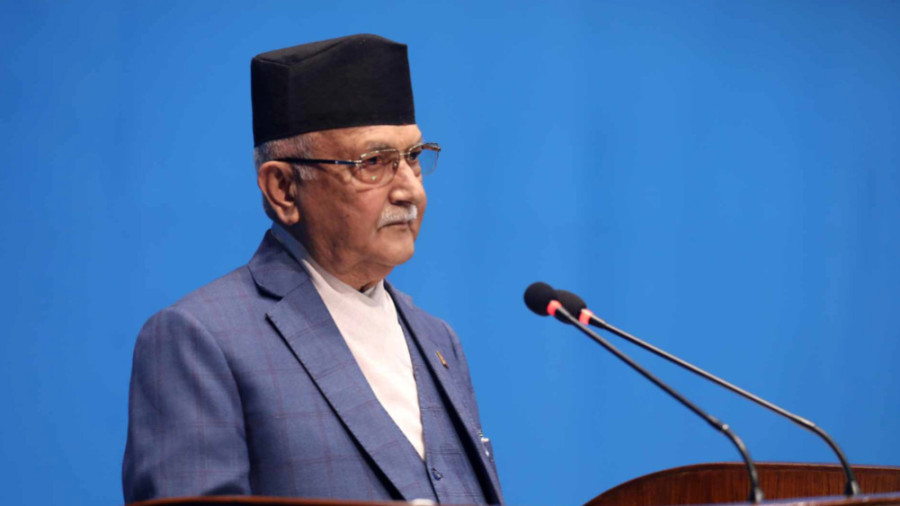National
Government working to sign power trade deal with Bangladesh at earliest: Prime Minister Oli
Oli also gave details on how the government is working on a long-term plan to export 10,000 MW electricity to India in next decade.
Post Report
Prime Minister KP Sharma Oli has said that the government is working to sign the agreement to export 40 megawatts of electricity to Bangladesh through India.
Responding to the queries of the lawmakers in the House of Representatives on Thursday, the prime minister claimed that most of the tasks relating to the power trade with Bangladesh have already been concluded and there was a plan to sign the pact in the presence of the energy ministers of Nepal, India and Bangladesh last month.
The scheduled event was cancelled due to political unrest in Bangladesh.
The then Bangladeshi Prime Minister Sheikh Hasina resigned and fled the country on August 5 and Nobel laureate Mohammad Yunus became the interim prime minister of the country on August 8.
"A Power Sales Agreement (PSA) was set to be signed on July 28 in Kathmandu between the Nepal Electricity Authority, the Bangladesh Power Development Board, and India's NTPC Vidyut Vyapar Nigam Limited in the presence of the energy ministers from Nepal, India, and Bangladesh,” Oli said. “However, the event was postponed due to unrest in Bangladesh.”
The prime minister gave the details in the House meeting responding to the question asked by former foreign minister NP Saud.
He noted that the agreement, which has been six years in the making since the energy cooperation between Nepal and Bangladesh was established, remained a top priority for the Nepali government.
A meeting of the ‘Cabinet Committee on Government Purchase’ in Bangladesh in the second week of June had approved a proposal to import 40 megawatts of electricity from Nepal.
“Given the recent developments in Bangladesh and the formation of an interim government there, the Ministry of Foreign Affairs and the Ministry of Energy, Water Resources, and Irrigation of Nepal are working to finalise the agreement as soon as possible,” he added.
Prime Minister Oli underscored the importance of the agreement saying that it will mark a significant milestone in sub-regional energy cooperation in South Asia, as it will be the first time Nepal exports electricity to Bangladesh.
Looking ahead, Prime Minister Oli presented details as to how the government is working on a long-term plan to export 10,000 megawatts of electricity to India over the next decade.
Stating that the Ministry of Energy, Water Resources, and Irrigation has prepared an Energy Development Roadmap and Action Plan 2080, he said Nepal’s total electricity generation capacity will be 28,500 megawatts by the fiscal year 2034/35.
“Out of 28,500 megawatts, around 13,500 megawatts will be used to address the domestic demand, and about 15,000 megawatts will be exported to neighbouring countries India and Bangladesh, and may be to other countries as well. This roadmap and action plan have been presented to the Council of Ministers,” he said.
Currently, Nepal's total electricity generation capacity stands at around 3,240 megawatts.
Responding to another question regarding the allegations that the government was mulling over the exemption of tariffs for various industries, which entertained the dedicated and trunkline services of Nepal Electricity Authority, the prime minister clarified that his government would not advocate for waiver of the tariff, rather it would opt to ask for the tariffs ensuring uninterrupted power supply to the industries.
He also ruled out the ‘rumours’ about the dispute between the government and the NEA leadership and said that the government merely ‘suggested’ the power utility to ensure power resumption to the industries.
The energy authority had cut off the power supply to Reliance Spinning Mills, Ghorahi Cement, Arghakhanchi Cement, Jagdamba Steel, Jagdamba Synthetics and Hulas Steel since July 9 for not clearing the due.
Minister for Energy, Water Resources and Irrigation Dipak Khadka had even dismissed Kapil Acharya and Bhakta Bahadur Pun from the post of the board of directors of Nepal Electricity Authority as they stood firmly against the government’s directives to resume power supply to the industries irrespective of their dues.
The Supreme Court had issued a stay order reinstating both Acharya and Pun to their posts until the next order.
After constant pressure from Prime Minister Oli and the decision of the NEA Board, the power was resumed to the industries from July 24.




 9.83°C Kathmandu
9.83°C Kathmandu













